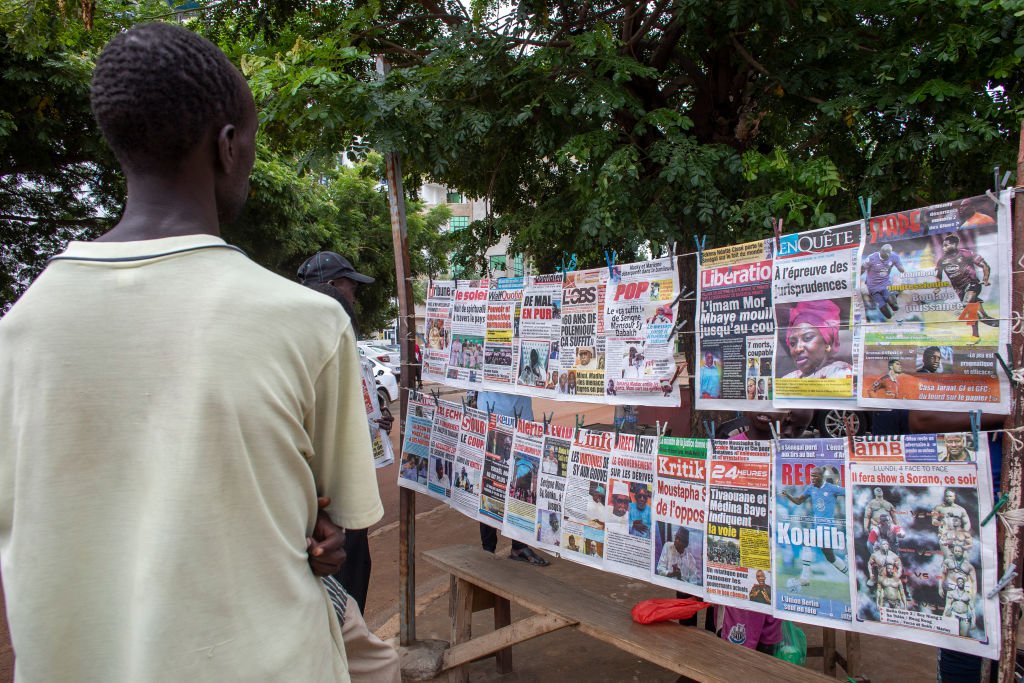
INTRODUCTION
On 13th September 2024, President Bassirou Diomaye Faye dissolved the opposition-led National Assembly, clearing the way for early legislative elections on 17th November. The number of summonses of political figures and columnists critical of the new authorities has increased since 13th September 2024.
Various groups joined forces and created a coalition called “Samm Sa Kaddu” for the legislative elections. It is composed of Tawawu, the PRP, Serviteurs, Arc, Agir and the movement Gueum sa bopp. Members of the Sàmm Sa Kàdd electoral alliance are critical of the harassment of journalists and lament this aversion to contradiction. The coalition has also expressed its desire to propose a “bill to repeal the amnesty law concerning events linked to demonstrations between February 2021 and February 2024.”
Gueum sa bopp’s leader is Bougane Guèye Dany. On 2nd October 2024, he was placed in police custody for the offence of spreading false news. He is accused of having contradicted Prime Minister Ousmane Sonko on the figures given at his press conference on the country’s economic situation. He was released the next day. When the Moody agency downgraded Senegal’s sovereign credit rating on 7th October 2024, Bougane Guèye Dany expressed on his Facebook page that “The deterioration of the country’s image is the result of six months of ill-considered decisions and amateurism.” On 19th October 2024, he was arrested.
On 19th October 2024, Bougane and other opposition figures were travelling to Bakkel to visit and support flood victims whose houses were destroyed recently. They were intercepted by the Gendarmerie Nationale and a heated exchange followed. The Gendarmerie explained that they had forced their way through a roadblock set up to allow the convoy of President Bassirou Diomaye Faye, who was also visiting this region. Bougane was arrested for rebellion and resisting arrest. Later, the charge of contempt of an officer was added. He was brought to the public prosecutor in Tambacounda on 21st October and will be tried on 30th October. His arrest comes just four weeks ahead of the early parliamentary elections on 17th November, in which he is a candidate. The electoral campaign starts on the 27th October 2024.
Nous demandons la remise en liberté de M. Bougane Gueye Dany, placé en garde á vue suite á un refus d'obtempérer, selon la gendarmerie nationale. Cet incident mineur qui n'a pas mis en danger la vie des personnes doit être placé dans le contexte pré électoral actuel. 1/2 pic.twitter.com/V23IcjVXUD
— Seydi Gassama (@SeydiGassama) October 20, 2024
The questioning of political figures and journalists in recent weeks casts doubt on the new government’s commitment to represent a break from the previous government.
FREEDOM OF EXPRESSION
Judicial harassment, intimidation of journalists ahead of legislative elections
At the end of September, a pirogue with 30 dead migrants was found by fishermen off the coast of Dakar. Kader Dia, a SEN TV columnist, alleged during a broadcast that members of the national police had accepted bribes to allow the passage of such pirogues. On 30th September 2024, Dia was taken into custody and charged with disseminating false information and inciting hatred. Dia was released a few days later.
Kader Dia journaliste à la Sentv ne peut pas être arrêté ou aller en prison pour une chronique. Ça se règle par un dementi. Kader Dia doit être libéré immédiatement pour rejoindre sa rédaction. #FreeKaderDia https://t.co/FMDH5XmGxp
— Alioune Tine (@aliounetine16) October 1, 2024
On 1st October 2024, Cheikh Yerim Seck, founder of the Dakaractu news site and former contributor to Jeune Afrique, was summoned and questioned by the police cybercrime division. He was also charged with disseminating false news and defamation. During his programme on the private television channel 7 TV, he refuted figures put forward by the Senegalese government on the economic situation inherited from the previous administration. The journalist supported his comments with figures published on the website of the Senegalese Ministry of Finance.
On 2nd October 2024, the same cybercrime division summoned opposition politician Bougane Guèye Dany. As mentioned above, he was placed in police custody for the offence of spreading false news. Bougane Guèye Dany was a journalist, then a businessman at the head of a powerful group that includes a television channel, a radio station, a daily newspaper, a news website and a communications agency and, more recently, founder of the citizen movement Gueum Sa Bopp and now a political opponent. He had also expressed the view that Prime Minister Ousmane Sonko’s statements about the country’s level of debt and public deficit were false.
The summoning of the three men, less than two months before the early parliamentary elections, caused an outcry among journalists’ and human rights organisations, as well as the opposition. The Council of Press Broadcasters and Publishers in Senegal denounced what they call acts of intimidation against the press.
On 3rd October 2024, all three men were released.
When they were still in opposition, Ousmane Sonko and Bassirou Diomaye Faye had vigorously protested against arrests for the offences of defamation or spreading false news. In July, the National Conference on Justice, convened by the President when he came into office, proposed repealing the offence of insulting the Head of State. Seydi Gassama, the director of Amnesty International in Senegal, points out that international law deems prison sentences for the offences of defamation or spreading false news to be ‘disproportionate’. In Senegal, this offence is punishable by up to three years’ imprisonment (see Articles 254 and 255 and 259 to 263 of the Penal Code). Human rights organisations have been calling for several years for prison sentences to be abolished in this area.